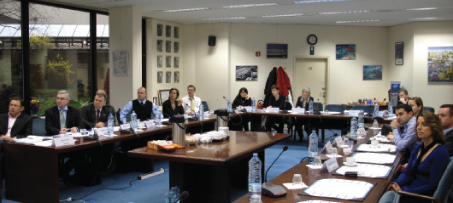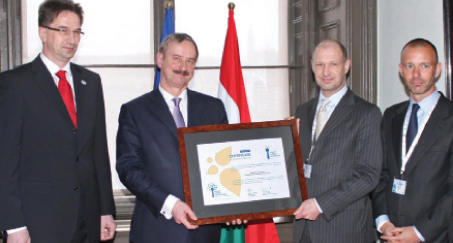
As part of ACI EUROPE’s efforts to help accredited airports, the association hosted a special Airport Carbon Accreditation Communications Workshop on 17 March; over 20 participants attended, from airports all over Europe.
The latest update on Airport Carbon Accreditation benefits from a very promising start to the year, as airports who submitted applications in the final months of last year received confirmation of their accreditation from the independent programme administrator, WSP Energy & Environment. The year began with the certification of a first complete airports group – Portuguese airports operator ANA – they achieved the accreditation of all 7 of their airports at the ‘Mapping’ level. Meanwhile, on the other side of Europe, Moldova’s Chisinau International Airport also entered the programme at the ‘Mapping’ level, as did Budapest Airport, where EC Vice-President in charge of Transport Siim Kallas presented them with their certificate, during the recent air traffic movements conference which took place in Budapest as part of the Hungarian Presidency of the EU.
Moving up a level to ‘Reduction’, Athens International Airport achieved this level of accreditation, progressing from its original ‘Mapping’ status. Germany’s Hamburg Airport succeeded in entering the programme at the ‘Reduction’ level as well, while London-Gatwick – the busiest single runway airport in the world – also made the grade. Last year, Gatwick launched its ‘Decade of Change’ sustainability strategy for developing the airport in a sustainable way over the next 10 years. Stewart Wingate, CEO of Gatwick commented “Our target is to reduce our carbon emissions by 50% over the next 10 years. Achieving the ‘Reduction’ level of Airport Carbon Accreditation signals an important milestone for us. We are already well on our way to achieving the next level of accreditation as we look to reduce our carbon emissions year-on-year.”
Both Frankfurt Airport and Manchester Airport – two of the earliest airports to originally become Airport Carbon Accredited when the programme launched in 2009, moved up from ‘Reduction’ to reach the ‘Optimisation’ level. Just as we were sending this issue of Airport Business to print, Amsterdam-Schiphol had just received news of its accreditation at the ‘Optimisation’ level. And finally, following hot on the heels of its Dutch neighbour, another one of Europe’s top 10 busiest airports, Munich Airport also became Airport Carbon Accredited for the first time, achieving ‘Optimisation’ from the get go. Michael Wühle, Vice President Environmental Protection, Munich Airport, described the accreditation as very important for the airport. “Currently the priority is climate change and our CO2 reduction measures. We believe that we can reach the ‘licence to grow’ from the public and the region if we can show that Munich Airport does a lot in terms of decreasing CO2 emissions. In 2009, Munich Airport set a strategic goal of achieving carbon neutrality in its future growth by 2020 for measures and activities within its direct sphere of influence,” he said.

Budapest Airport has entered Airport Carbon Accreditation at the ‘Mapping Level’. L to R: Pál Völner, Hungary’s Minister of State for Infrastructure of the Ministry of National Development; Siim Kallas, European Commission Vice President in charge of Transport; Jost Lammers, CEO, Budapest Airport; and Olivier Jankovec, Director General, ACI EUROPE.
With these developments, Airport Carbon Accreditation now covers 43 airports in 18 European countries. This accounts for over 43% of European passenger traffic, which are collectively responsible for the reduction of over 749,000 tonnes of CO2. In less than two years, the programme has achieved a reduction equivalent to taking 200,000 cars off the roads!
As part of ACI EUROPE’s efforts to help accredited airports, the association hosted a special Airport Carbon Accreditation Communications Workshop on 17 March, at their offices in Brussels. The event was free and saw over 20 participants attend, from airports all over Europe. The workshop took stock of the ways that accredited airports have been communicating their CO2 achievements, with the aim of helping others make the most of their accreditation.







